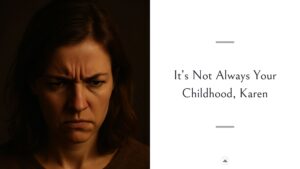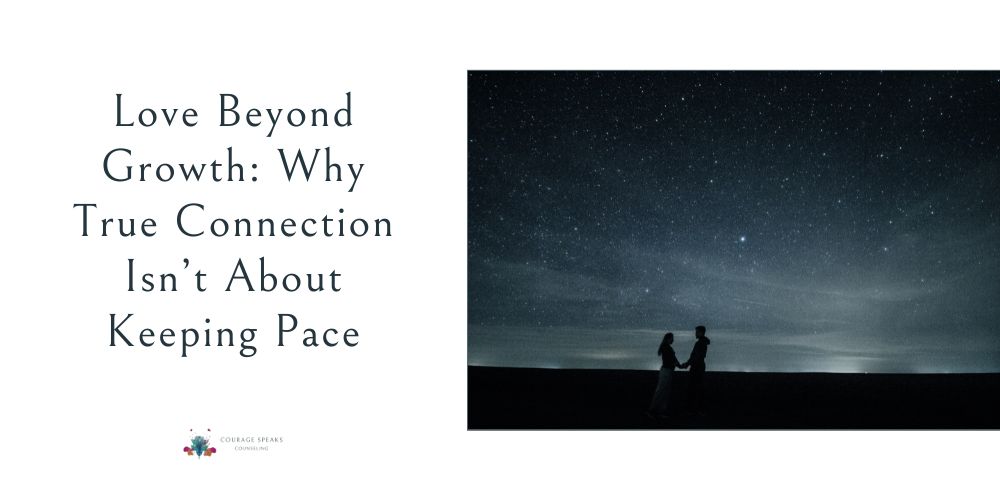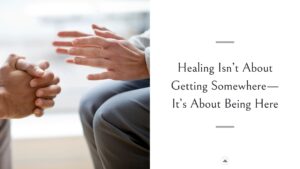
It’s Not Always Your Childhood, Karen
Not everything you’re struggling with is rooted in your past. Sometimes, the situation you’re in right now is genuinely harmful—and it’s okay to trust that clarity without needing a deep

In the world of personal growth, there’s a common trap we can fall into—the belief that if someone truly loves us, they’ll evolve in the same way or at the same pace we do. This mindset can lead to frustration, disconnection, and even resentment. The belief that someone’s growth, or lack thereof, reflects their love for us is not only misguided—it’s harmful to both parties.
But there’s another layer to this: just as we might expect others to grow with us, we also hope that those who’ve grown more than us will still love us where we are. Before we started our healing journey, many of us held onto the hope that people would love us from that unhealed, unaware place. And if we’re being honest, that hope is still there, even as we make progress. We want to be loved despite our blind spots—those areas we can’t yet see or work on—and we hope others can love us even when they see those blind spots clearly.
From a healing perspective, we often carry unresolved wounds from earlier relationships that create these expectations. We want others to mirror our growth as proof of their love, or we fear that those further along in their journey will outgrow us. The truth is, everyone’s growth is unique, tied to their own experiences, capacities, and readiness. Expecting someone to grow on our timeline or worrying they’ll leave us behind is more about our unmet needs than about love itself.
When we look at these dynamics closely, we often uncover a wounded part of ourselves that longs to feel seen, understood, and valued. This part may believe that only by the other person “catching up” can we feel truly loved. But here’s the reality: love isn’t measured by growth. It’s measured by presence—by showing up authentically, even when our paths are different.
The irony is, when we can let go of these expectations, we create space for deeper connection. By releasing the need for someone to mirror our progress or keep us within their pace, we free both ourselves and them to be present in the relationship as it is, not as we think it should be. Love isn’t about keeping score on growth; it’s about accepting one another, even when the journeys don’t align.
It’s important to recognize that real love doesn’t depend on whether someone is growing faster or slower than we are. Likewise, growth doesn’t demand validation from others, and love doesn’t hinge on reaching certain milestones. The work here is recognizing where our own unmet needs come from, addressing them internally, and releasing the projections we place on others.
And here’s the thing—everyone, no matter how “far along” they are in their healing, still has blind spots. We’ll always have areas we can’t yet see or understand, and it’s these blind spots that make the expectation of others to “grow like us” not only unrealistic but also hypocritical. We hope to be loved despite our own blind spots, yet we may struggle to extend that same compassion to others who are navigating their own journey.
In the end, we cannot control how others grow, nor can we rely on someone’s pace to define their love for us. What we can control is how we show up—for ourselves and for them. And when we do, we often find that love was there all along, patiently waiting to be seen without conditions. True love transcends growth—it meets us, again and again, wherever we are on our path, blind spots and all.
Embracing Shadows, Illuminating Hope,
Chelsey Fjeldheim, LCSW
Empowering Souls on the Path of Healing
Copyright © 2024 Chelsey Fjeldheim, Courage Speaks Counseling

Not everything you’re struggling with is rooted in your past. Sometimes, the situation you’re in right now is genuinely harmful—and it’s okay to trust that clarity without needing a deep

Healing isn’t about returning to who you were—it’s about learning to live fully in the present and trusting the unfolding of your journey after life-altering events.

Healing isn’t about fixing yourself. It’s about staying present, feeling fully, and letting transformation happen without force.

Because you matter. You are important. You are worth it.